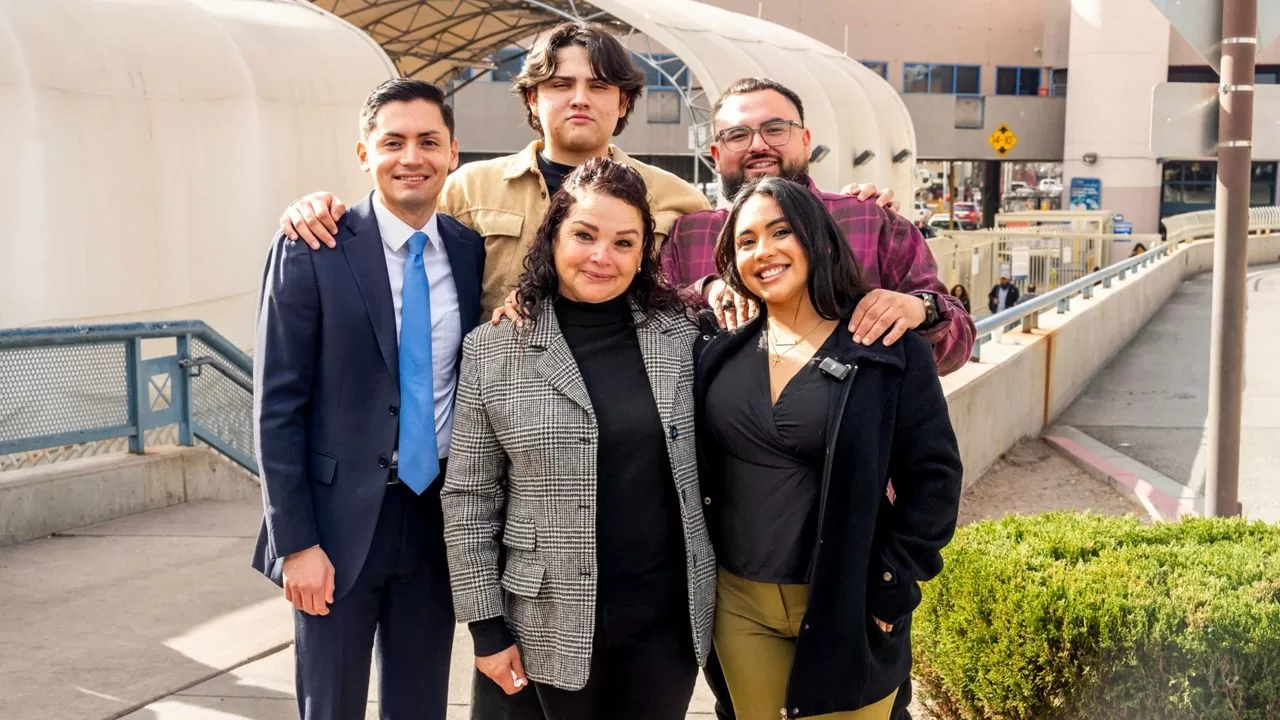After having been separated from her children for more than 14 years due to the complex immigration system in the United States and the Covid-19 pandemic, Mexican Gloria Montoya finally returned to her home in Tucson, Arizona.
“When I heard the immigration agent at the Nogales port of entry tell my mother ‘Welcome,’ I couldn’t hold back my tears. Even so, I felt that from one moment to the next they were going to stop us and say that my mother could not enter the United States,” Bill de la Rosa, a law student at Yale University, told EFE.
In 2009, Montoya went to what was supposed to be a routine appointment at the United States consulate in Ciudad Juárez, Mexico, to obtain his green card. The undocumented immigrant made her request based on the fact that she was married to an American and she had four children who were also citizens of this country.
However, to the family’s surprise, she was not only denied residency but was prevented from returning to her family in Arizona and was forced to remain in Mexico for the next 14 years.
Bill, who was only 15 years old at the time, suddenly became father and mother to his brothers, since his father, Arsenio de la Rosa, was 74 years old and suffered from serious health problems.
The young man considers that his mother’s case is a clear example of how broken the American immigration system is.
“To begin with, my mother followed the legal process. We hear so often that immigrants should use ‘the legal path’, that we take our ‘place in line’. We did it and yet we were punished for it,” she said.
Like many others, this family trusted the lawyer they hired and submitted Montoya’s application for permanent residence without knowing that a law popularly known as the ’10-year law’ was passed in 1996.
This provision punishes immigrants who have lived irregularly for more than a year in the United States by requiring them to live in their country of origin for 10 years before being eligible to regularize their immigration status.
During that period, Arsenio passed away in 2018. When he was on his deathbed, the office of Congressman Raúl Grijalva (D-Ariz.) helped the family process a 30-day humanitarian visa that allowed Montoya to say goodbye to her husband.
“Fourteen years ago, Gloria and her family were devastated by the shortcomings of the American immigration system.
“Our office helped the De La Rosa family for more than a decade navigate our complex immigration system.
Last weekend, Gloria was reunited with her family,” Congressman Grijalva wrote in a message on social media.
Fourteen years ago, Gloria and her family were torn apart by the brokenness of the US immigration system.
Our office helped the De La Rosa Family for more than a decade navigate our complex immigration system.
This past weekend, Gloria was reunited with her family. pic.twitter.com/P6Thxk3JEf
— Raul M. Grijalva (@RepRaulGrijalva) January 22, 2024
Extended punishment
The mother was also a victim of covid-19 since when her 10 years of punishment had ended, the pandemic occurred and all immigration procedures were suspended. In this way, her sanction was extended to 14 years and 99 days before being approved as a legal resident.
“We spent fourteen years separated, we suffered a lot, but fortunately we had the support of our community and Congressman Raúl Grijalva, and we still fought a lot to bring my mother back home. “I can’t imagine how hard it is for families who don’t have this support,” Bill said.
For his part, Montoya describes it as “a dream” to be able to be with his family again. On January 20, his ordeal ended when she finally returned to Arizona and was able to hug his children, this time as a legal resident of the United States.
“It was a long time apart. I do not deny that many times I lost faith, hope,” Montoya told EFE.
For her, the most difficult thing was being separated from her children when they were still very young. “The youngest was four years old and now she is eighteen. “It is a lot of time lost, time that I will never be able to get back,” she lamented.
“When I left them they were children and other teenagers; now they are adults. My goal now is to get to know them again. It was a long time without them, without being able to go to school meetings, their graduations,” she explained.
Although her children frequently visited her in Nogales, a city in the Mexican state of Sonora on the border with Arizona, she assures that she always lived with the uncertainty of not knowing how they were.
She says that many times she saw the border wall and couldn’t stop thinking that behind it were her children, her husband, her true home.
When she set foot in the United States again, the first thing the family did was go to the cemetery to visit Arsenio’s grave. “I owed it to my father. We went to tell him ‘Mission accomplished, our mother is back,’” Bill said.
“This case shows how complex and sometimes how unfair the immigration system can be,” Claudia Arévalo, an immigration lawyer in Arizona, told EFE.
Arévalo, who was not connected to Montoya’s case, said the law allows Americans, upon reaching the age of majority, to request legal residency for their parents.
However, when completing the procedures, foreigners are asked how long they have lived irregularly in this country, how they entered and, above all, if they have left and returned again. The way they respond depends on whether or not they are punished with the 10-year law.
“There are many parents with children who do not complete this procedure and prefer to continue living in the shadows for fear of being punished with ten years,” said the lawyer.







